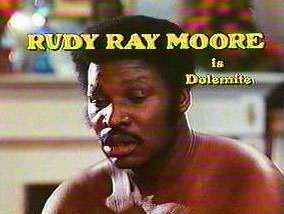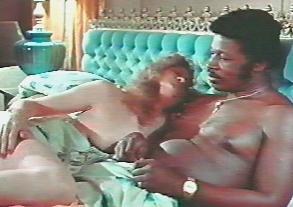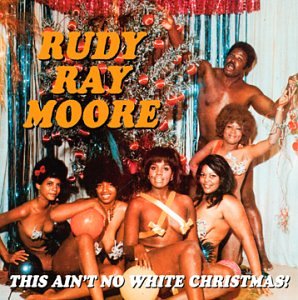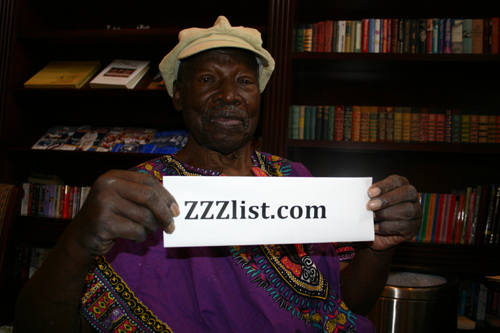
Rudy Ray Moore/Dolemite
Rudy Ray Moore/Dolemite
Comedian/Singer/Actor/Writer/Director
Rudy Ray Moore is a singer turned comedian who created
1970's blaxploitation films featuring himself as DOLEMITE and
Petey Wheatstraw.
My rant...
It bothers me when people don't recognize
who this man is and what his accomplishments are. First of all, This
is Rudy Mother-fucking Ray Moore.
Dolemite god dammit...
DOLEMITE!!! If you don't know who he is, go to
Youtube and do
a search for "Dolemite". You'll laugh your ass off. And if you don't
laugh, then fuck off and LEAVE THIS WEBSITE RIGHT NOW!!
P.S. Why doesn't this man have a star on the Hollywood "Walk of
Fame"?

Here is something that we put together highlighting Mr. Moore's career:
And the great Snoop Dogg recently laid it all out on camera...
Video courtesy of Donald H Randell Productions
The history...
Rudy Ray Moore started his career in the entertainment business as a dancer and an R&B singer. Eventually, he embraced a career in stand-up comedy which was a springboard to the creation of the character DOLEMITE, which earned him the cult following that he still has today.

Unapologetically black, Rudy was first shunned by Hollywood. But instead of giving up, Rudy built his dream all by himself. The man financed his own movies, built his own sets, wrote his own material, and used his own home to create his classically hysterical blaxploitation flicks which are still in demand today. Read his bio for a more detailed description of the comedy genius Rudy Ray Moore. I LOVE THIS MAN!

What makes him ZZZlist material?
-
Rudy was the first comedian to say "fuck" on a record. He paved the way for Redd Foxx and Richard Pryor.
-
His old school rhymes influenced today's mainstream rap music. To this day, Rudy Ray Moore and Funkadelic bass player Bootsy Collins are the most sampled artists in rap music history.
-
He did it all by himself... his own way.
The interview...
Ro Hurley: I saw
that video that you just did with Snoop Dogg.
Rudy Ray Moore: Oh, I did a lot of stuff with the Dogg.
He went out there
and told people: Hey, respect this
man. Did you see that?
No. But I know his ideas about me. He talks very, very well about me all the time. I knew him before he ever had a record. Anyway, he had done his first album with me, and later on after he did the biggest album he ever done was done with me. It was called "The Chronic." Oh, that's not Snoop. That's Dr. Dre is "The Chronic." This one was one that Dr. Dre produced. I worked with the Dogg. I worked on four or five of the Dogg's albums, you know, a special guest.
Were you live or did they sample you?
I was live on three of them, and I was sampled on several others. "Top Dogg, No Limit" was the one I was sampled the most on. "Top Dogg, No Limit."
You also worked with Eazy-E.
I did three with Eazy-E and then four with Snoop Dogg and various other rappers, 27 of them in all.
Wow.
So you're probably the most sampled.
I was considerably, at one time, the--along with James Brown and Bootsy Collins. We were the most sampled entertainers. There were more people sampled us than they did anyone. And as a regular stand-up comic, I am the most sampled stand-up comic.
Your background is
in music, so a lot of your comedy material is rhythmic and rhyming.
I am into rhyming, but I am a singer now. I'm singing very strong now. They call me the man with the cashmere voice, reminiscent of Billy Eckstine probably.
I should say so.
I listened to your album, your, "Hully Gully Fever."
Oh, you know how old "Hully Gully Fever" is?
How old is it?
Fifty years old.
Really?
Would you think that I sounded that well 50 years ago?
It was incredible.
The "Hully Gully Fever" was some old stuff I had in the basement in one of my places and I wanted to do something with it. I was throwing it out. And he said to me, let me push this to a company. I may get them to pick it up. He got me $15,000 for the tapes. But it was old tapes that I had from years ago. They mastered it and put it out.
Good. What about the
Dolemite character?
Dolemite is mine. I own the Dolemite character. There's "Petey Wheatstraw," "Dolemite, The Human Tornado," "Disco Godfather." I released them to Xenon Pictures. But I have a new one now. It's called "The Dolemite Explosion." That one is still at home. I'm going to let it go after a while.
I saw part of it.
On YouTube, they had a small clip, a promo. You still have the female
army or the female crew, and then you had Don Magic Juan.
He's in it. I just left him the day before yesterday in Chicago for his ball.
Oh, did you go to
the, what is it, the Hookers' Ball or something?
Yes, I went to it.
How was that?
It was nice.
That's good. Was Snoop there?
No, Snoop didn't come. Snoop don't come anymore. He don't feel too comfortable in there because of the type of people that come in there.
Right, because it's the East Coast-West
Coast thing?
Yes.
Now that reminds me.
I was wondering, your material, when you were younger was incredibly edgy
and very racy and occasionally sexist, occasionally somewhat racist and such.
And I'm wondering …
Not too racial.
No, not really. But did that
ever get people, did you ever feel threatened by anybody?
No.
Because when you came about, it was the
'60s, it was during that whole civil rights revolution.
No, I never had any problem with people getting mad with me about this and that. Oh, there were people who thought it was controversial that may not have liked it, but I was all right doing it, and I was all right with most of them.
Really?
Any protesting or anything?
No protesting.
What does that say?
You know, I mean that now you can't really put anything out without
people having a fit, but back then, you know, you could be as racy as you wanted
to.
I had, oh, people in that period of time, they were not, I don't know what they wasn't comfortable with, but it sold so very well, and I was so clever doing it. I used hard-line words just to be using them. I used them where I'd like to get a good punch line.
Did you come up with
your rhyming schemes in advance?
Yes. My mother taught it to me in school and church programs.
She taught you to
remember your lines or something?
Yes, and Robert Louis Stevenson, Henry Wadsworth Longfellow, the old poets from years ago, I used to study their poetry and recite it in church programs.
Wow.
So do you think, is that the origin of rap?
Because you took the street smarts, right?
You took the hardness and the flow and it seems like people have adopted
that somewhat as rap music.
Yes, I am the world's first. I come out with rap on one of my records. This is a rap I used to tell while sitting on my daddy's lap. And I used the word "rap" in that particular monologue and followed it with another one called "The Signifying Monkey," which turned out to be a classic. And that was about the beginning of the contemporary rap days when I did "The Signifying Monkey," set to musical background.
What do you think of Redd Foxx and
Richard Pryor? Why do you think they
made it more mainstream?
Redd Foxx is much older than all of us. He started off first doing what we were doing, and he was the first one who broke through. Richard Pryor is in after me and Redd Foxx. He come along with a satire and got the industry to involve itself in him, and he made it very good. But Redd Foxx was the first of us. That's how he come along as big as he was, but criticized a lot. Redd Foxx was criticized a lot by the industry.
Why do you think?
I don't know. I don't even care because I was the same thing he was. So whatever they did say about him, naturally it fell on me, too.
Right.
But your act, to me, from what I've heard, was a lot more racy.
I've listened to all the old Redd Foxx tapes, and I've listened to your
old tapes. And, to me, yours had
more of an edge for that era because of the strong subjects that you would talk
about; you know, the graphic sex descriptions and the language.
But they were very sexy oriented but not down on race.
I was thinking that you might have a hard
time in the '60s was the white women in your films because, you know, how people
are closed-minded in the South, you know, or wherever, I was thinking that that
might have caused you some trouble.
No.
Now, Dolemite was a womanizer. Was that
the Dolemite exaggeration? Did you
live that life?
I got that toast from a fellow walking the street in Los Angeles. He recited that thing to me when I was working in a record store called Dolphins on Hollywood. And he had no teeth, and he used to come in there and say, "Gimme some money for some soup." And so I'd say, "Well, do Dolemite." And people would be in the store, and they heard him do that and they just fell out. So I took it, brought him to my house and gave him some reefer and wine, and we recorded on a tape cassette. I recorded it, and the rest is history. It hit the first day I put it out. I carried it to the record store that I was running there. I put it on, stuck the needle to it, and the needle said: "Some folks say that Willie Green was the baddest the world ever seen." And the people said, "Give it to me. I don't want to hear no more." Carried it home, and in a half-hour, 30 people had come to the store to buy it.
But did your
lifestyle parallel Dolemite's? Did you get that much pussy when you were young?
No, I was not pimpin' and all that. I was a family man.
What are you currently working on?
I know you have your movie coming out.
I'm working on "Dolemite Explosion." But it's going to get me back where I want to be. It is so hilarious and so many things I got going on in it. And I've got a new record called "Let me Sing to You." I did such tunes as the one that, what's his name--what's the fella's name? It's called "Rock and Roll." It's got rock and roll in it, all the way in it. It's Dobie Gray. His song, I did it on this new album.
When you answered the phone earlier and
said, "This is the king," I was so
thrilled to hear that you still had your strong voice.
I mean, you still had that strength behind it, and that's really
impressive. And I'm glad, too,
because you can tell that it's the same voice that I was listening to that I
heard singing all those great songs from the '50s.
I'm lucky that I can still work. You know, I go to work sometimes every week, different clubs across country.
I like what you would come up with, like
the “rat soup eating mother-fucker”, and you'd say, "I'm going to beat you up
with her breasts," you know, something like that.
Was that off the top of your head?
Yes, that's off the top of my head.
That's good stuff.
Now, what are you the most proud of?
You've done music, you've done comedy, you've done acting.
You're a parent. What are you
the most proud of in your lifetime?
I'm most proud of me being able to come back, as I foresee it, as a great, "The Dolemite Explosion." It is so good, and it's been cut so well, until I just don't believe it can miss. Because I've got sex acts in it, three or four of them. I've got the karate marshal arts fights in it, three of them. And numerous bits of acting, with comedy and some violence. So the film is exciting, and I'm very excited over it.
Now, do you have any regrets in your
career? Anything that you look back
that you wish you had done differently?
No. The reason why I don't is because I was a self-made child. Nobody has come forward to help me. So there is nothing else that I could have done because I had no help to do nothing else. I had to do whatever I could do on my own, including making my albums. My first album was "Dolemite." I made it, structured it and mastered it and walked across country and promoted it, with a trunkload of albums, giving them out to people in the street, saying, "Take this record home and let your friends hear it." It was the type of record that people would enjoy from the first listen. So I have no regrets because, as I say, all of this stuff, I did it myself, and I'm proud of the way I done it.
You did your albums at home.
You know, like it was a cocktail hour, a comedy show, and that was
amazing, not just for the money saving's aspect but for the intimate aspect of
it.
I did my albums at home, did my motion pictures at home, in my apartment. I made the sets. I decorated the rooms. If I needed a jail or a sheriff's office, my set decorator would make that, put "Sheriff" on the outside, the window where the camera was aiming, put the people behind the desk, and a man dressed in a uniform. We did that all ourselves. A hospital, we'd take a hospital bed, put in there, and make a hospital room out of it. So we did all of this special effects ourselves. Like big film companies, it would cost them a fortune for special effects. I did the special effects for $1.49. When Dolemite ripped a man’s guts out. I made that for $1.49. I went to the grocery store and got some of those whole chickens. I took some Karo syrup and red dye. I got the one kind of Karo syrup where it looked like blood, put it in a plastic bag and tucked it to the man's shirt. And when the camera hit it, the red come out--$1.49. This is what I had to do in order to get a film made because I didn't have the money. I had little money.
Yeah, you took your
money from your music and made your movies.
From my albums. So I am proud of what I've done, and I did it myself. I had no one to help me. I made it and did it my way.
I think that's what a lot of people
should recognize you for too. Now
that is part of, to me, what makes you a legend.
So do you feel legendary?
Yes, I do. Because I feel that way. And I'm very proud of it and go places and will let it stand out.
A hundred years from
now, when like film school students are studying you or comedy students are
studying you, what do you think your footprint will be in history, as far as
entertainment?
It will be probably like some of the old-timers that made movies years ago and the expertise that they had in doing them. Mine will probably be, if they know the history of how it was done. It depends on how far movies go in the future and what they're made on, like on DVD. Now they're going to have another form of something to put them on. And these people have to make these movies a different way by having other types of things to show them on. So they probably will look at us and see how we done it with what we had and probably be trying the same thing with the monies that they have because film making is very expensive. And when this new format come in, they're really going to have a rough time. People doing that at that time will probably come out with junk, which I come up with pretty nice ones.
So my final question is, I was wondering,
when you die, what do you want on your headstone?
Would you put a rap or a rhyme or what would you want to say on your
headstone for people to come by and see?
I haven't thought of that. I wouldn't want no pizza on it for sure. Not on my tombstone, don't put no pizza on it because I can't smell, eat, or taste it.
Links:
http://www.myspace.com/rudyraymoore
http://site.dolemiterecords.com
